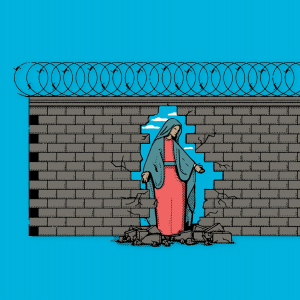
Nancy Frausto, a DACA recipient, is associate rector at St. Luke's Episcopal Church in Long Beach, Calif.
Posts By This Author
Mary’s Song of Sanctuary
The Magnificat is a call to action.
EVERY EMPIRE IN human history has used the tactics of fear. This fear is evident in the fact that for generations a dark skin hue has automatically made a person at best suspect, at worst a criminal. The empire identifies those whose language and nationality are different as less than human. Dehumanization becomes a tool to justify heinous laws, promoting them as necessary to protect citizens from a horde of savages, criminals, rapists, thugs, or whatever new word is used to instill fear.
Our sacred texts tell the stories of emperors, rulers, and pharaohs who justified mass extermination to maintain power. Herod the Great is one example. Herod was a ruler so deranged and paranoid about losing power that he had his wife, brother-in-law, and three sons murdered to wipe away any trace of royal blood who might challenge his throne.
It is under Herod’s rule that we encounter the revolutionary words of Mary as she proclaims her song of praise, the Magnificat (Luke 1:46-55). For generations, Christians have reduced the Magnificat to a simplistic, spiritual song from a docile, obedient girl chosen by God. The political undertones and demands for justice against rulers and laws that oppress God’s people are rarely elevated.
